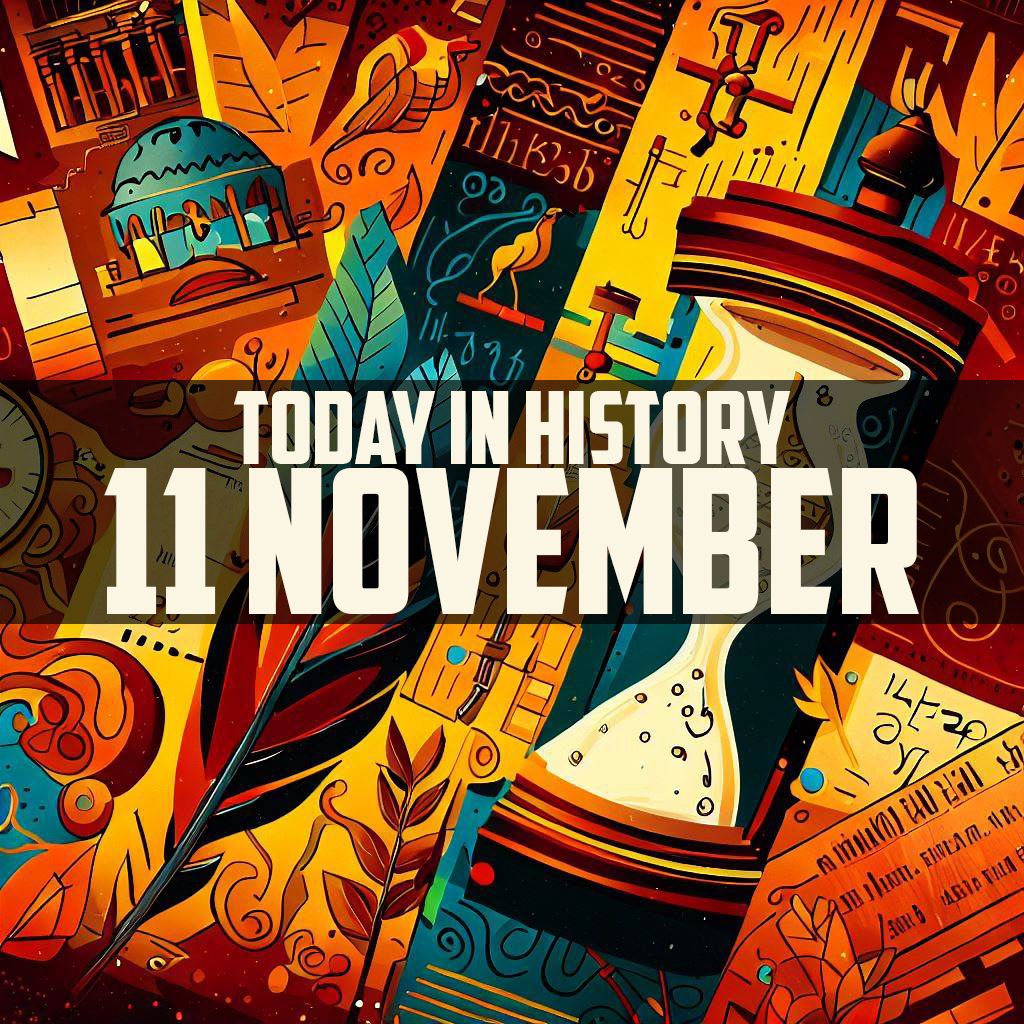November 11 holds a significant place in global history. Widely known for its association with the armistice that ended World War I, it’s a day that evokes strong emotions and stands as a testament to the courage and sacrifice of millions. This day has seen moments of joy, sorrow, hope, and reflection. Let’s delve deep into the annals of history to uncover the events that have shaped this day.
Today in History: 11 November

1. Armistice Day (1918)
Undoubtedly the most famous event associated with November 11 is the signing of the armistice between the Allies and Germany, which marked the end of World War I. It came into effect at the 11th hour of the 11th day of the 11th month, hence the significance of the date. Hostilities formally ceased, ending four years of one of the bloodiest conflicts in history. Today, many countries observe this day as Remembrance Day or Veterans Day, commemorating the fallen heroes of the war.
2. Veterans Day (U.S.)
In the United States, November 11 is observed as Veterans Day, a federal holiday that honours military veterans. Originally called Armistice Day, it was renamed in 1954 to pay homage to veterans of all wars, not just World War I. It’s a day of national pride and reflection, where the sacrifices of military personnel are acknowledged and celebrated.
3. Remembrance Day (Commonwealth Nations)
For Commonwealth member states, November 11 is observed as Remembrance Day. Much like Veterans Day, it commemorates the armistice and pays respect to the military personnel who lost their lives in the line of duty. The red poppy flower, inspired by the poem “In Flanders Fields” by John McCrae, has become a symbol of this day, representing the blood spilt during the war.
4. Poland Regains Independence (1918)
On the same day the armistice was signed, Poland regained its independence after 123 years of partitions and foreign rule by Austria, Russia, and Germany. Józef Piłsudski took over control of the military in Warsaw, marking the beginning of the Second Polish Republic.
5. Birth of Fyodor Dostoevsky (1821)
One of the greatest literary figures, Russian novelist Fyodor Dostoevsky, was born on November 11, 1821. His profound psychological insights into the human soul are evident in works like “Crime and Punishment,” “The Brothers Karamazov,” and “The Idiot.” His exploration of philosophical and existential themes has left an indelible mark on literature.
6. Opening of the Tomb of Tutankhamun (1922)
British archaeologist Howard Carter and his team discovered the entrance to Pharaoh Tutankhamun’s tomb in the Valley of the Kings on November 4, 1922. However, it was on November 11 that they officially opened the tomb, unveiling a treasure trove that provided invaluable insights into ancient Egyptian culture and life. The discovery also fueled modern interest and fascination with ancient Egypt.
7. The Rhodesian Declaration of Independence (1965)
On November 11, 1965, in a unilateral move, the British colony of Rhodesia, led by Prime Minister Ian Smith, declared itself an independent nation. This act was not recognized by the United Kingdom or the international community due to concerns over minority rule and racial discrimination. The nation remained in a state of international isolation until 1979.
8. Death of Yasser Arafat (2004)
Palestinian leader Yasser Arafat passed away on November 11, 2004. A pivotal figure in the Middle East, he was the Chairman of the Palestine Liberation Organization and President of the Palestinian National Authority. His death marked a significant moment in Palestinian history and the larger Israeli-Palestinian conflict.
9. The Church of England Approves Female Bishops (2014)
The Church of England’s general synod voted in favour of allowing women to become bishops on this day in 2014. This was a landmark decision that ended centuries of male-only leadership within the Church.
10. Angola’s Independence from Portugal (1975)
After centuries of Portuguese colonization and a long-fought liberation war, Angola finally gained independence on November 11, 1975. This moment marked the end of one of Africa’s longest and most devastating colonial wars.
11. Birth of Leonardo DiCaprio (1974)
While certainly not on the magnitude of world wars and national independence, the birth of Hollywood actor Leonardo DiCaprio on November 11, 1974, deserves mention. An acclaimed actor, DiCaprio’s roles in films such as “Titanic,” “The Revenant,” and “The Wolf of Wall Street” have solidified his place in cinematic history.

Conclusion
November 11 stands out as a day of profound global importance. From moments of peace to groundbreaking cultural shifts, this day captures the essence of humanity’s struggle, progress, and hope. Whether we remember the fallen heroes of war, celebrate the birth of great minds or reflect on cultural milestones, November 11 serves as a powerful reminder of our shared history and the potential for a brighter future.
See more:
